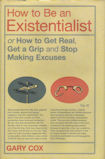An attack on contemporary excuse culture, the book urges us to face the hard existential truths of the human condition. It uncompromisingly counsels us to become tougher and more dignified, less grumbling and irresponsible, to stop chasing rainbows and making excuses and instead to get a grip and get real. By revealing that we are all inescapably free and responsible – ‘condemned to be free’, as Sartre says – the book aims to empower the reader with a sharp sense that we are each the master of our own destiny.
Cox makes fun of the reputation existentialism has for being gloomy and pessimistic, exposing it for what it really is – an honest, uplifting and potentially life-changing philosophy!
Cox provides an overview of the philosophy of existentialism, and what not to do, and what to do, in order to become an existentialist.
In a nutshell, existentialism claims to be the philosophy of making choices based on recognising what reality is, and taking responsibility for those choices. In a second nutshell, from Cox’s descriptions, existentialism appears to be a philosophy for smug middle-class male misanthropes.
A lot of the suggestions about being authentic, making deliberate choices and taking responsibility, seem very plausible and refreshing. However, after not long, the emphasis on making choices begins to exude a flavour of middle-class privilege. Satre gives an example of an inauthentic soldier, someone just pretending to be, rather than authentically being, a soldier. He might be rationalising this based on his own experience during WWII. The idea is that, an existentialist, having chosen to be a soldier, takes responsibility for that choice, accepts without complaint that this is the situation, and acts authentically by ‘being-in-situation’. Of course, in this case, the alternatives to not being a soldier during wartime conscription are rather limited: if they were to choose the alternative of being an imprisoned objector, say, should they then act authentically as a prisoner? Satre says yes, but appears to have had it rather easy in his role as a soldier:
Yeah, that’s not being an authentic soldier.
The philosophy also has a somewhat privileged view on responsibility. Another example from Satre is about relationships. Having changed due to making authentic choices, and taken stern, cold responsibility for this, it means that the newly authentic soldier will now behaves differently towards his wife.
Satre would reply that it is in fact easy for the man to stop loving his wife and so resist imposed inauthenticity because love is only the choice to be in love. But can any man really choose to stop loving his wife?
Several points here. (1) Satre is a monster. (2) Satre is not giving the wife any agency in this thought experiment (and seems not to realise that women are people too, in other examples quoted). (3) Satre is not recognising that the earlier choice to marry his wife also results in responsibilities. (4) Cox admits that there may be some things that existentialists insist are choices that in fact are not choices. He has a few other examples, but does not play this out fully. For example, he has a real hate-on for obesity, seeming to assume it is simply due to mere gluttony, and is a bad choice, and that obese people are not taking responsibility, somehow. This seems to be a fault of the overall philosophy: the idea that you can freely choose to do various things as a simple matter of disembodied will, that later scientific advances have demonstrated are more complicated than that.
It’s not just Satre who comes across as a middle-class male misanthrope. Cox appears to be one too: in places I think he trying to be funny, but it usually lands quite nastily. For example, when talking about being a teacher, a job he initially hated, he says:
I suppose that if you subscribe to a philosophy that thinks “Hell is other people”, such statement might appear funny and authentic, rather than merely mean-spirited.
So, do I recommend this book? Well, I now know a lot more about existentialism than I did before. And it is short.
